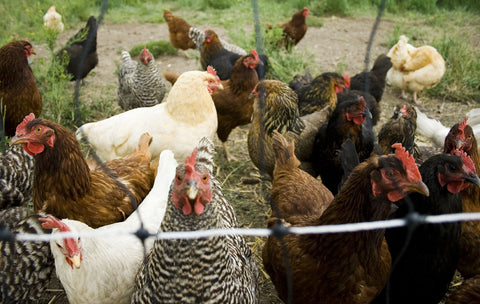This week’s Green Man’s Blog post continues on the topic of incorporating biochar into livestock management, in particular as a livestock feed supplement for poultry and pigs as covered by a recent review article by Schmidt et al. (2019). See last week’s post here for a recap on some of the study highlights for cattle feed supplementation.
Biochar as a feed supplement for poultry
Biochar added to chicken feed at 0.6-2% significantly increased body weight of both broiler hens and laying hens in the first 28 days (study from Kana et al., 2010). In another study, it was reported that biochar also improved the digestibility and subsequent feed efficiency of feed high in protein but which that is typically hard to digest by chickens, e.g. chickpea (study from Kana et al., 2012).
The addition of biochar to poultry feed was shown to increase egg production by 5% and increase the collagen content and strength of eggshells, consequently improving the shelf life of eggs and improving the resource quality of collagen sourced from eggs for pharmaceutical and cosmetic industry purposes (study from Yamauchi et al., 2013).
Biochar in poultry feed was broadly observed as improving the health of poultry by reducing the abundance of major pathogens, e.g. the gram-negative bacteria: Helicobacter and Campylobacter (study from Prasai et al., 2016).

Biochar in feed is shown to increase the weight of poultry and improve the health of animals.
Biochar as a feed supplement for pig
A number of studies (see Chu et al. 2013a; 2013b and 2013c) investigating biochar as a feed supplement in pigs demonstrated enhanced animal growth, improved animal health indicators as well as improved quality of meat products. Biochar supplemented in pig feed at 0.3% of basal diet resulted in an average feed efficiency increase of 17.5% compared to control animals. The study found that further increasing the rate of feed supplementation (to 0.6% of basal) diet did not further pronounce this effect, indicating that biochar in feed has an inherent performance curve. Pigs in the biochar feed experimental group were also indicated to have a reduced susceptibility to stress, with lower measured cortisol levels, as well as having improved blood plasma results (measuring protein, albumin and cholesterol levels).
Biochar in feed was found to improve the quality of pork meat by reducing the saturated fat content and increasing the unsaturated fat content, and by increasing the storage capacity of pork products. Whilst an additional study found that biochar supplemented feed at 0.3% of basal diet increased weight gain comparable to standard growth-promoting antibiotic treatment, indicating that biochar could partially improve non-targeted low level antibiotic treatments that inadvertently promote antibiotic resistance among pathogens and the various negative public health and economic implications associated with indiscriminate antibiotic use in the livestock industry (study from Chu et al., 2013c).
Further, a study supplementing pig feed with a biochar-wood vinegar mix (ranging from 0.6-0.8% biochar, and 0.2-0.3% wood vinegar of basal diet) reduced the negative effects of pig-fattening with a protein rich diet, e.g. symptoms of diarrhoea and formation of poisonous hydrogen sulfide (a.k.a rotten-egg gas) where significantly reduced in pens (study from Mekbungwan et al., 2008).
The above findings demonstrate clear benefits from supplementing relatively small amounts of biochar into regular feed regimes, such as stimulating animal growth, controlling emissions from manure production and providing a low-cost and non-invasive alternative to growth promoting antibiotic treatments.
In next week’s blog post, Green Man will cover some of the key outcomes from research supplementing feed for goat, sheep and aquaculture.

Feeding biochar to pigs not only increases feed efficiency but also helps control odour from pens.
Further reading:
For further reading and links to individual studies, see the full review paper and references by Schmidt et al. (2019):
Schmidt, H.P., Hagemann, N., Draper, K. and Kammann, C., 2019. The use of biochar in animal feeding. PeerJ, 7, p.e7373.
Studies covered:
Chu GM, Jung CK, Kim HY, Ha JH, Kim JH, Jung MS, Lee SJ, Song Y, IbrahimRIH, Cho JH+2 more. 2013a. Effects of bamboo charcoal and bamboo vinegar as antibiotic alternatives on growth performance, immune responses and fecal microflora population in fattening pigs. Animal Science Journal 84:113-120
Chu GM, Kim JH, Kang SN, Song YM. 2013b. Effects of dietary bamboo charcoal on the carcass characteristics and meat quality of fattening pigs. Korean Journal for Food Science of Animal Resources 33(3):348-355
Chu GM, Kim JH, Kim HY, Ha JH, Jung MS, Song Y, Cho JH, Lee SJ, IbrahimRIH, Lee SS+1 more. 2013c. Effects of bamboo charcoal on the growth performance, blood characteristics and noxious gas emission in fattening pigs. Journal of Applied Animal Research 41(1):48-55
Kana JR, Teguia A, Mungfu BM, Tchoumboue J. 2010. Growth performance and carcass characteristics of broiler chickens fed diets supplemented with graded levels of charcoal from maize cob or seed of Canarium schweinfurthii Engl. Tropical Animal Health and Production 43(1):51-56.
Kana JR, Teguia A, Fomekong A. 2012. Effect of substituting soybean meal with cowpea (Vigna unguiculata WAL) supplemented with natural plant charcoals in broiler diet on growth performances and carcass characteristics. Iranian Journal of Applied Animal Science 2:377-381
Mekbungwan A, Yamauchi K, Sakaida T, Buwjoom T. 2008. Effects of a charcoal powder–wood vinegar compound solution in piglets for raw pigeon pea seed meal.Animal 2(3):366-374.
Prasai TP, Walsh KB, Bhattarai SP, Midmore DJ, Van TTH, Moore RJ, Stanley D.2016. Biochar, bentonite and zeolite supplemented feeding of layer chickens alters intestinal microbiota and reduces campylobacter load. PLOS ONE 11(4):e015406
Yamauchi K, Manabe N, Matsumoto Y, Yamauchi K-E. 2013. Increased collagen accumulation in eggshell membrane after feeding with dietary wood charcoal powder and vinegar. Connective Tissue Research 54(6):416-425
